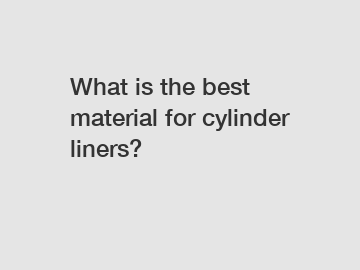Cylinder liners are an important component of an engine, providing a smooth and durable surface for the piston rings to slide against. The material used for cylinder liners plays a crucial role in the overall performance and longevity of the engine. With several options available in the market, it can be challenging to determine the best material for cylinder liners. In this article, we will discuss the different materials commonly used for cylinder liners and analyze their pros and cons to determine the ideal choice.
**Materials for Cylinder Liners**.
**Cast Iron**.

Cast iron is one of the most common materials used for cylinder liners due to its excellent wear resistance and thermal conductivity. It is also relatively inexpensive compared to other materials, making it a popular choice for many engines. Cast iron cylinder liners come in various grades, with higher-quality grades offering superior performance and durability. However, cast iron liners can be heavy and may require thicker walls to achieve the desired strength, which can affect the overall weight of the engine.
**Aluminum**.
Aluminum is another popular material for cylinder liners, known for its lightness and excellent heat dissipation properties. Aluminum liners can help reduce the overall weight of the engine, improving fuel efficiency and performance. However, aluminum is not as wear-resistant as cast iron and may require special coatings to enhance durability. Proper maintenance and frequent inspections are essential to prevent aluminum liners from wearing out prematurely.
**Steel**.
Steel cylinder liners are commonly used in high-performance engines due to their exceptional strength and durability. Steel liners can withstand higher levels of heat and pressure, making them ideal for engines operating under extreme conditions. However, steel liners can be heavy and may contribute to increased overall weight. They also require precise machining and installation to ensure proper fit and function.
**Ceramic**.
Ceramic cylinder liners offer superior wear resistance and thermal stability compared to other materials. They can withstand high temperatures and pressures without deforming or wearing out quickly. Ceramic liners are also very lightweight, making them an excellent choice for engines that require high power output and fuel efficiency. However, ceramic liners are more expensive than other materials and may be brittle, requiring careful handling during installation.
**Composite Materials**.
Composite materials, such as carbon fiber or fiberglass reinforced polymers, are gaining popularity as cylinder liner materials due to their lightweight and high strength-to-weight ratio. Composite liners can offer excellent wear resistance and thermal conductivity while reducing overall engine weight. However, composite materials may be more expensive than traditional options and require specialized manufacturing processes.
**Conclusion**.
In conclusion, the best material for cylinder liners ultimately depends on the specific requirements of the engine and its intended use. Cast iron is a cost-effective and reliable choice for most applications, offering excellent wear resistance and thermal conductivity. Aluminum and steel are ideal for high-performance engines that require superior strength and durability. Ceramic and composite materials are suitable for engines that demand lightweight components and exceptional performance.
When selecting a material for cylinder liners, it is essential to consider factors such as cost, weight, strength, heat dissipation, and wear resistance. Consulting with industry experts and conducting thorough research can help engine builders make informed decisions regarding the best material for their specific needs.
Overall, each material has its unique advantages and disadvantages, and the best choice will depend on the specific requirements of the engine. Proper maintenance and regular inspections are crucial to ensure the longevity and performance of cylinder liners, regardless of the material used.
Contact us to learn more about selecting the best material for cylinder liners and how we can help improve the performance and longevity of your engine.
Contact us to discuss your requirements of Shale Shaker Screen Supplier, drilling mud desander for sale, swivel bail elevator link. Our experienced sales team can help you identify the options that best suit your needs.




Comments
Please Join Us to post.
0